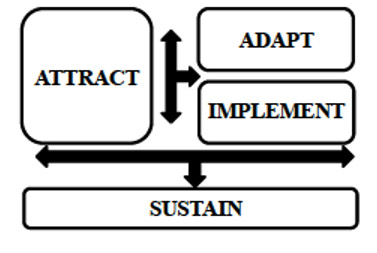AAIMS project

The objective of the AAIMS project is to increase access to an evidence-informed exercise program focused on reducing falls in aging adults. This project is funded by CIHR from 2022 until 2028.
Objectives
Attract
Team lead: Dr. Shilpa Dogra, Ontario Tech University
Goal: Improve accessibility to fall prevention exercise programs by working on attracting equity-deserving and underrepresented groups in community fall prevention exercise programs.
Project updates
- Dr. Dogra and her team are working to develop a survey and interview guides that allow us to understand the needs of underrepresented groups to better attract them to community-based fall prevention programs. The team will be working with racialized people, people with disabilities, members of the 2SLGBTQQIPA+ community, and men as these groups are currently under-utilizing evidence-based fall prevention programs.
- Dr. Dogra’s team is also currently developing a new tool that will enable researchers to better understand the effects of sex and gender on health and health behaviour outcomes in community-based research projects such as the AAIMS project.
Adapt
Team lead: Dr. Kathryn Sibley, University of Manitoba
Goal: Evaluate currently available fall prevention exercise programs to assess whether they are evidence-informed, and if not, provide guidance and support to become evidence informed.
Project updates
- Dr. Sibley and her team are currently conducting a scoping review using the Consolidated Framework for Implementation Research (CFIR) to assess potential facilitators and barriers to implementing an evidence-informed fall prevention exercise program. The findings of this scoping review will help guide all four streams of the AAIMS project by identifying and predicting barriers that will need to be addressed and facilitators that can help enhance the implementation process.
- The project team is also collaborating with Move50+, an initiative based in Québec that provides high-quality pre-recorded exercise videos for adults aged 50+, to develop an evidence-informed fall prevention module focused on challenging balance. The provinces of Saskatchewan and Newfoundland are also priority locations that will eventually be collaborating with the research team.
Implement
Team lead: Dr. Danielle Bouchard, University of New Brunswick
Goal: Work with community partners to implement Zoomers-on-the-Go, a free peer-led evidence-informed fall prevention exercise program, in communities where none currently exist.
Project updates
- The Implement team is working closely with several community partners in the provinces of Nova Scotia, Alberta, and Ontario to guide the implementation of Zoomers-On-The-Go, an evidence-informed community fall-prevention exercise program which originated in Saint John, New Brunswick. The provinces of British Columbia and Prince Edward Island are priority locations that will eventually be collaborating with the research team.
- Specific gaps have been identified in each location (such as rural communities and risk-specific populations) and strategies are currently being employed to meet the needs and work with the resources available in each location. Community partners involved in these discussions includes representatives from local health authorities, government divisions dedicated to the health and wellness of older adults, injury-prevention organizations, local governing bodies in health and fitness, as well as established non-profit organizations such as the YMCA.
- As part of the IMplement initiative, we are running an online training session for adults aged 50+ who are interested in leading online fall-prevention exercise programs for seniors. The training will take place in June/July with evaluations taking place in August, and the leaders being ready to lead online classes in September 2023.
Sustain
Team lead: Dr. Scott Kehler, Dalhousie University
Goal: Evaluate the sustainability of currently available fall prevention exercise programs and subsequently provide guidance and support on how to improve the longevity and sustainability of these programs.
Project updates
- The sustainability aspect of the AAIMS project will focus on the sustainability of evidence-informed fall prevention programs, as well as the sustainability of personnel involved in facilitating and leading these programs such as peer-leaders.
- Dr. Kehler and his team are selecting the appropriate tools to assess the sustainability of currently available evidence-informed fall prevention exercise programs for older adults to inventory the sustainability of these programs in Canada. Programs that demonstrate a high sustainability score will then be evaluated via focus groups to gain insight on their sustainability plans and processes that have led to their successful sustainability. Identified characteristics from sustainable programs will then be used to develop a sustainability toolkit which will serve as a guide to both adapting a program to be sustainable or implementing a sustainable program from the grassroots level.
